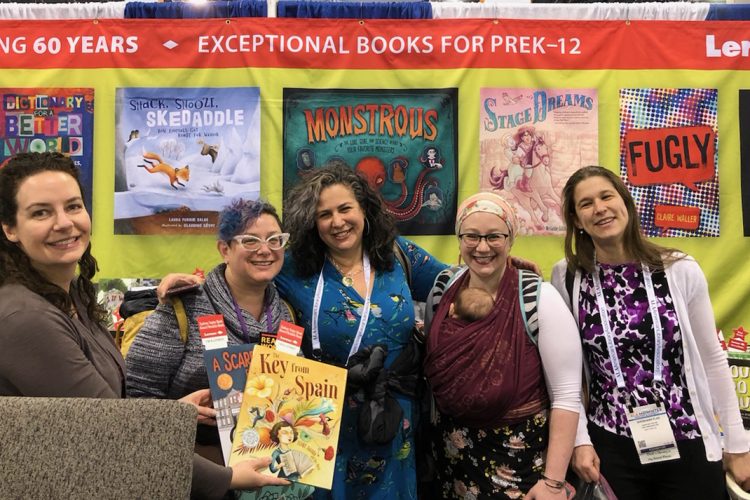Two Kar-Ben Publishing Titles Commended by Association of Jewish Libraries’ Sydney Taylor Book Award Committee

The Key from Spain: Flory Jagoda and Her Music, a picture book written by Debbie Levy and illustrated by Sonja Wimmer, and A Scarf for Keiko, a picture book written by Ann Malaspina and illustrated by Merrilee Liddiard, were named a Sydney Taylor Honor Book and Notable Book, respectively. Kar-Ben Publishing®, a division of Lerner Publishing Group™, published both titles.
The Sydney Taylor Book Awards are given to outstanding books for children and teens that authentically portray the Jewish experience. They are awarded annually by the Association of Jewish Libraries, a division of the American Library Association (ALA). The ALA awards were announced yesterday at the American Library Association’s Midwinter Meeting in Philadelphia.
The Key from Spain: Flory Jagoda and Her Music
The Key from Spain tells the true story of Ladino singer Flory Jagoda, whose Sephardic Jewish ancestors are forced to leave Spain during the Spanish Inquisition. They take with them their two most precious possessions—the key to their old house and the Ladino language. When Flory flees Europe during World War II to begin a new life in the United States, she carries Ladino with her as her ancestors did, along with her other precious possessions—her harmoniku and her music. Though the house key is lost in the war, Flory uses music as a key to connect to her Ladino traditions and share them with others.
Author Debbie Levy’s reaction to the honor was many-layered.
“What a thrill to learn that The Key from Spain was a Sydney Taylor Honor recipient! A thrill because book awards are fun, of course, but also because as a girl, I *adored* the All-of-a-Kind Family books—by Sydney Taylor. I *loved* our local library, in Silver Spring, Maryland, and the library at our synagogue—and I borrowed the All-of-a-Kind books multiple times from both places. So to receive an award that commemorates Sydney Taylor and that is given by the Association of Jewish Libraries—that is really meaningful to me.”
“I was introduced to the wonders of Flory Jagoda and Sephardic music by Susan Gaeta, Flory’s musical protégé and a musician of great talent in her own right. (Go listen to her music when you’re done reading this!) And I was introduced to Susan by my dear friend of many years, Karen Simon, and her husband, Jon Simon—a jazz pianist and composer who has performed with Susan. This book came about with a little help from my friends!”
“Awards like this one can help raise the visibility of a book. So I’m excited to think that, thanks in part to the Sydney Taylor recognition, more children—Jewish children, but not only Jewish children—will be introduced to The Key from Spain and will see that Jewishness comes in many ‘flavors’ and from many different places. I’m also excited to think that readers young and not-so-young will emerge from the book with a feeling of curiosity about the Ladino language, Sephardic music, and the long intertwined history of Jews, Muslims, and Christians. And I hope Flory Jagoda’s story will add to the bank of understanding of and appreciation for the beauty and richness that immigrants—such as Flory!—bring to the United States.”
Praise for The Key from Spain:
“Levy’s captivating picture book biography tells the story of Flory Jagoda, known today as the ‘Keeper of the Flame’ of Sephardic culture and music.”—starred, School Library Journal
“An inspirational reclamation of history.”―Kirkus Reviews
A Scarf for Keiko
Set in 1942, A Scarf for Keiko follows a boy named Sam, whose class is knitting socks for soldiers. Sam is a terrible knitter. Keiko is a good knitter, but some kids at school don’t want anything to do with her because the Japanese have bombed Pearl Harbor and her family is Japanese American. When Keiko’s family is forced to move to a camp for Japanese Americans, Sam realizes he must stand up for his friend so he finds a unique way to show Keiko how much their friendship means to him.
Ann Malaspina took a few moments to share some of the history behind her book.
“I’m honored that A Scarf for Keiko was recognized by the Sidney Taylor Book Award, along with so many wonderful books. I appreciate Kar-Ben and editors Joanna Sussman and Amy Fitzgerald, as well as illustrator Merrilee Liddiard, for making the story come to life. I got the idea for A Scarf for Keiko after reading how a small number of people took a risk to reach out to Japanese American friends and neighbors forced into internment camps during World War II. They sent care packages, wrote letters, and even visited their friends. Jewish students in Los Angeles were among those who tried to help their incarcerated classmates. Like Sam and Keiko in my story, both groups learned that small gestures of friendship – like a knitted pair of socks or a scarf – can help to defy intolerance and oppression. I hope young people who read the story find ways to do the same in their own lives.”
Praise for A Scarf for Keiko:
“A rich source for discussion, both about outward political oppression and the inward struggle to behave honorably amid it.”—Publishers Weekly
“A gentle and accessible story of tolerance . . .”―Kirkus Reviews
—
More information about these two titles and these commendations is in our press release.
Comments